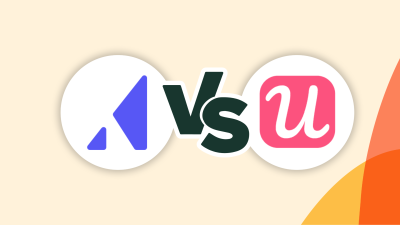Today we have a special match up for you: Appcues vs Userpilot. In the blue corner is Appcues, a known heavyweight in the product adoption space. In the red corner is the young challenger, Userpilot. Founded in 2018, Userpilot has shot itself up as a worthy competitor. Will Appcues prevail as one of the leading solutions? Or will Userpilot successfully knock Appcues down from its pedestal?
In this article, we'll take a closer look at Appcues and Userpilot and compare their features, pricing, and user experience to help you make an informed decision on which platform is better suited for your needs.
Let’s get ready to rumble!
Appcues vs Userpilot Snapshot
There are a lot of similarities between the two platforms at a glance. They both offer user onboarding and various UI patterns such as tooltips, checklists, self-serve widgets, and in-product surveys. Their UX patterns are quite close in terms of variety.
Here is a brief snapshot of the two tools compared side by side.
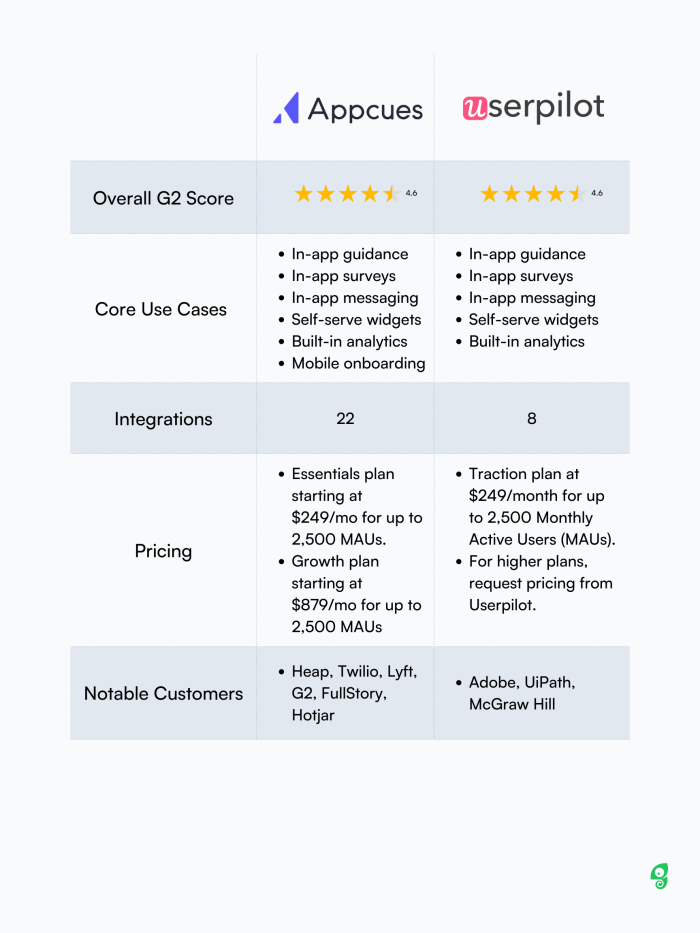
However, considerable differentiators do exist. Mainly they are for mobile onboarding and integrations, both in Appcues’ favor. Let's dig in further.
Comparison by feature
First, let’s take a look at the features of both tools. In particular, we’ll look at their differences in terms of UX patterns, Analytics capacities, integrations, and mobile onboarding.
UX Patterns
Here is how the two platforms square off against each other when it comes to UX patterns. Both offer pretty much a similar set of features and they are as varied as the other.
UX Pattern | Appcues | Userpilot |
|---|---|---|
Modals | Yes | Yes |
Tooltips | Yes | Yes |
Hotspots | Yes | Yes |
Slideouts | Yes | Yes |
Banners | Yes | Yes |
Checklists | Yes | Yes |
Resource Center | Yes (Launchpad) | Yes |
NPS | Yes | Yes |
Surveys | Yes | Yes |
So in terms of UX patterns, either Appcues or Userpilot could be good to fulfill product adoption needs.
Aside from this, they also both have experience throttling, localization support, and various other customization and targeting solutions. Just looking at their builders, it really comes down to which UX you prefer.
Product analytics
Both Appcues and Userpilot offer similar product analytics capabilities, with integrations with popular analytics tools, custom event tracking, user segmentation, A/B testing, funnel analysis, retention analysis, cohort analysis, and data visualization.
Neither Appcues nor Userpilot has a clear advantage when it comes to product analytics. Besides, for both tools, it’s more about being able to integrate with other solutions that are specialized for product analytics.
Integrations
In terms of integrations, Appcues wins handily over Userpilot. To start with, not only does Appcues have more than 20 integrations, but it also has 9 two-way integrations including for Salesforce and Hubspot.
Userpilot has only 8 integrations, and they are all already covered by Appcues. Here is the full table that shows all the integrations Appcues has and what Userpilot is missing:
Integration | Appcues | Userpilot |
Google Analytics | ✔️ | ✔️ |
Amplitude | ✔️ | ✔️ |
Mixpanel | ✔️ | ✔️ |
Heap | ✔️ | ✔️ |
Kissmetrics | ✔️ | ✔️ |
FullStory | ✔️ | ❌ |
Klaviyo | ✔️ | ❌ |
Localytics | ✔️ | ❌ |
Customer.io | ✔️ | ❌ |
Intercom | ✔️ | ✔️ |
Vero | ✔️ | ❌ |
Woopra | ✔️ | ❌ |
Slack | ✔️ | ❌ |
Salesforce | ✔️ | ❌ |
HubSpot | ✔️ | ❌ |
Zendesk | ✔️ | ❌ |
Marketo | ✔️ | ❌ |
Segment | ✔️ | ✔️ |
Google Tag Manager | ✔️ | ✔️ |
Zapier | ✔️ | ❌ |
RudderStack | ✔️ | ❌ |
For an onboarding tool that will integrate well with your existing tech stack, Appcues will be the better choice here.
Round goes to Appcues.
Mobile Onboarding
This one is simple. Appcues has native mobile onboarding for iOS and Android, as well as other widely used mobile app frameworks such as React Native.
In the case of Userpilot, they don’t have a mobile app onboarding feature.
Points go to Appcues for this one.
Comparison by customer experience
Of course, features are far from what makes you choose to commit to a solution. A great customer experience is a must. So let’s take a closer look at that.
First, let’s take a look at the G2 scores of Appcues and Userpilot.
Appcues | Userpilot | |
Ease of Use | 8.7 | 8.9 |
Ease of Setup | 8.5 | 8.5 |
Quality of Support | 9.2 | 9.8 |
Product Direction | 9.1 | 9.7 |
From a glance, we can see that Appcues and Userpilot have similar levels of customer satisfaction, with Userpilot pulling ahead noticeably for support and product direction.
Ease of Setup and Use
This is where Appcues and Userpilot practically tie in G2 scores. Reviews state how easy it was to set up for both tools, and how they had ample support when it came to installing the platform onto their products.
[Userpilot is] versatile, easy-to-use with great support
Creating guides/flows has never been simpler [with Appcues]
In addition, they talk about how both Userpilot and Appcues are built for non-technical team members to easily jump onto. For ease of use, their no-code editors are on an equal footing with each other.
Customer Success and Support
Userpilot pulls ahead for quality of support in G2 scores, but both scores are above 9.0, which means they both have excellent levels of customer service.
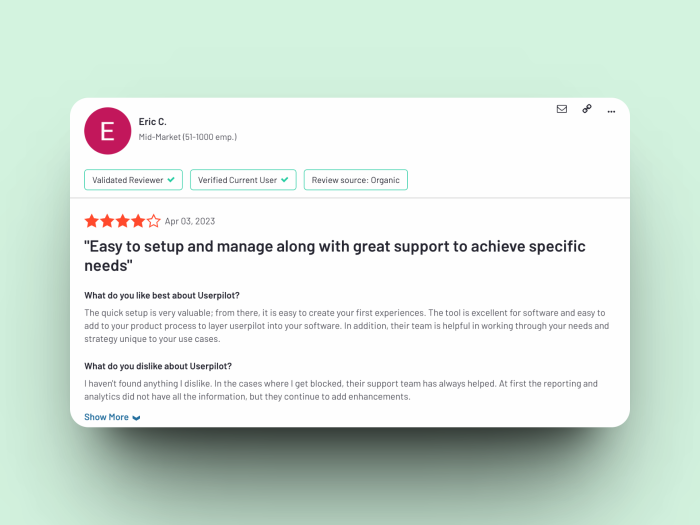
Userpilot review on support
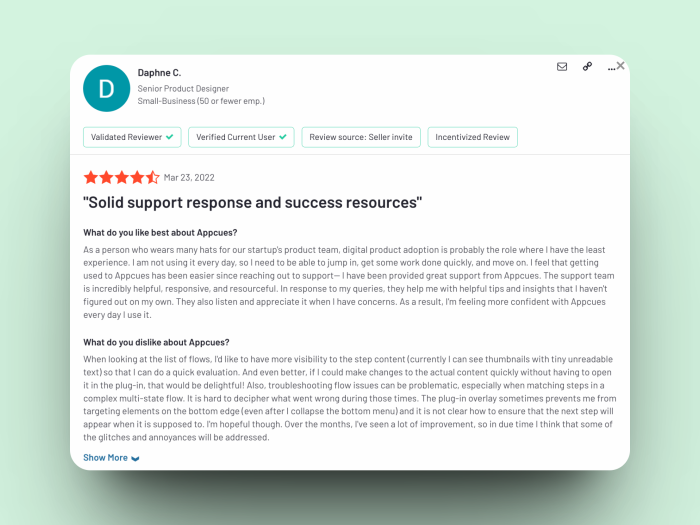
Appcues review on support
But, it’s not just active support and success that gets the job done for customers. Great customer education is also a big part of providing stellar customer success and support.
In that regard, Appcues pulls ahead because Appcues invests heavily in customer education. Appcues runs GoodUX which gives customers great inspiration for user experience building. Appcues also runs the Product Adoption Academy, which has useful courses like User Onboarding 101 and Product Launches 101.
So with all of that considered, this one goes to Appcues.
Product Velocity and Reliability
Appcues is much more on the ball when it comes to updating its product. For instance, a Userpilot vs Appcues comparison article from last year said that Appcues does not have A/B testing. Now they do. So that gap has been closed between the two software.
The Appcues changelog shows how Appcues frequently updates the product, putting out new features as well as integrations, which is an area that Userpilot continues to lag in.
Comparison by Value
Moving on, let’s talk about pricing and value for the two tools.
Free trials
Both Appcues and Userpilot offer a 14-day free trial that provides full access to their tools. So for either platform, you can have ample time trying them out and seeing if it’s right for your needs.
Pricing Plans
For Appcues, there are three plans: Essential, Growth, and Enterprise. The Essential plan starts at $249/month, the Growth plan starts at $879/month, and lastly, the Enterprise plan’s pricing is available upon request.
Userpilot also starts at $249/month with its Traction plan, with other plans needing a request to sales.
In terms of what you get with just the basic plan though, Userpilot seems to be a bit more generous. Userpilot’s Traction plan gives you 5 seats instead of the 3 given by the Essentials plan from Appcues. You can also track up to 10 user segments as opposed to Appcues’ 5, and custom goals for Userpilot is up to 15, while Appcues is at up to 10.
Also, Userpilot does seem to have more competitive pricing. For the Essentials Plan on Appcues, it’s $649 per month up to 20,000 MAUs, and after that you need to talk to sales. But for Traction from Userpilot, you can get up to 50,000 MAUs at $549 per month before you have to talk to sales.
For both, more advanced features are only available on a mid-tier Growth plan or higher. These include Custom CSS, Localization support, SSO, and additional integrations.
Final Verdict
So, after all this comparison, here’s the scorecard:
Appcues | Userpilot | |
|---|---|---|
UX Patterns | Tie | Tie |
Product analytics | Tie | Tie |
Integrations | 1 | x |
Mobile onboarding | 1 | x |
Ease of Setup and Use | Tie | Tie |
Customer Support / Success | 1 | x |
Product Velocity and Reliability | 1 | x |
Value | X | 1 |
Final Score | 4 | 1 |
In the end, Appcues proves to be a formidable foe. In most cases, Appcues comes out on top.
To summarize, if you want more competitive pricing, and your onboarding needs are more basic, then go for Userpilot. If you want a tool that integrates well with your existing tech stack, and has more sophisticated needs like mobile onboarding, stick with Appcues.
Use Appcues if you need an onboarding tool with more integrations and mobile support
While there are few things that are similar to each other, Appcues handily wins over Userpilot when it comes to integrations. Appcues has integrations that Userpilot simply doesn’t, like Zapier and Salesforce. So if you’re looking for a solution that will fit better with your existing stack, Appcues is the tool.
Plus, Appcues has a trick up its sleeve that Userpilot does not have. It has native mobile onboarding. If that’s a make-or-break factor, then go to Appcues.
Use Userpilot if you want an onboarding tool with competitive pricing
Appcues and Userpilot are both neck and neck when it comes to the features that they offer. Of course, Appcues pulls ahead on mobile onboarding and integrations, but where Userpilot has an advantage is its competitive pricing. On average, you’ll get a nice discount as opposed to Appcues. Plus, Userpilot is much more generous in terms of how much limit it puts on the user, such as the number of seats and the number of goals.
Our Suggestion: Chameleon, if you don’t require native iOS/Android support
Chameleon is hands down the best-in-class tool for creating in-app guidance and messaging. It is more expensive than Userpilot, but that is because you get that much value out of the tool. The range of customization and targeting is deeper than either tools.
Plus, Chameleon has many more integrations available than even Appcues, like Loom, Chili Piper, and Airtable, particularly when it comes to improving in-app user engagement.
And while Chameleon may not have native onboarding for iOS and Android, it does support mobile onboarding for various frameworks including Cordova, Ionic, and Flutter.
Try the interactive demo below and see for yourself! Don't settle for less.
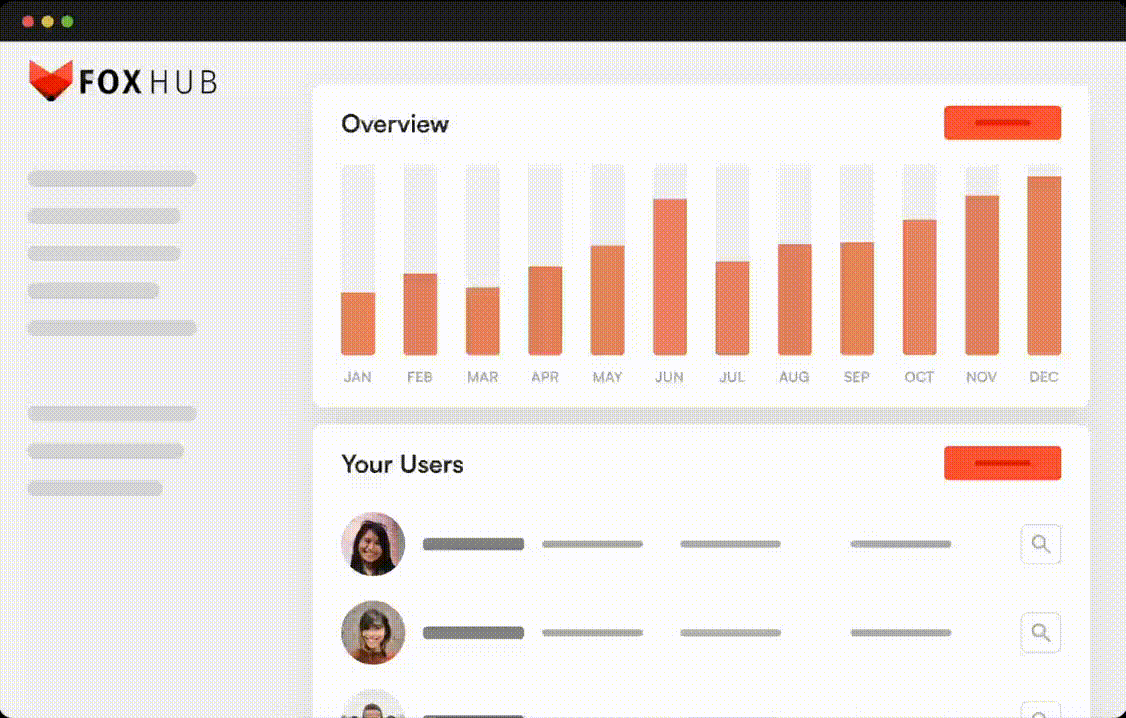
There's no alternative like Chameleon
Try the most versatile and customizable product adoption tool in the market
